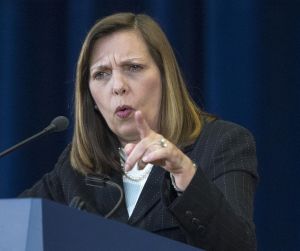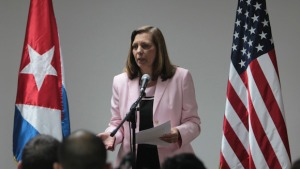(Courtesy: Cuba’s Prensa Latina) The Governor General of Canada, Julie Payette, today received Josefina Vidal in solemn audience, who introduced her to the Letters accrediting her as Ambassador Extraordinary and Plenipotentiary of Cuba in this country.
During the ceremony, which took place at Rideau Hall, the official residence of the governor, Vidal had an exchange with Payette, who expressed the interest of the Government of the Greater one of the Antilles to broaden and strengthen the traditional mutually beneficial relations between the two nations and peoples, a note from the Cuban embassy here.
Before being appointed to represent the government in Havana in Ottawa, Vidal was director general of the United States in the Chancellery of the Caribbean island.
On December 17, 2014 the Cuban president Raúl Castro and his American counterpart, Barack Obama, announced the decision to restore diplomatic relations between the two countries and to move toward the normalization of bilateral ties, a process in which Josefina played a role of first order.
From 1999 to 2003 was first secretary of the Cuban Interests Section in Washington and subsequently took over as General Manager of North America of the Ministry of Foreign Affairs of the Caribbean island, work which she did until being appointed ambassador to Canada.
Payette occupies the position since October 2017 and her functions eminently protocolary meetings as representative of the Queen Elizabeth is also preside over the inauguration of the Prime Minister, the chief judges and members of the Cabinet.
During the first 85 years of the existence of Canada only British personalities occupied that position, all with aristocratic titles, and became the first Canadian to reach the post was Vincent Massey in 1952, while the first female to head that office was Jeanne Sauvé, in 1984.
Editor’s Note: Josefina Vidal was among 16 Cuban spies handpicked by the FBI and Defense Intelligence Agency for expulsion in 2003. The Cuban spy-diplomats were thrown out in retaliation for Havana’s targeting of US operations against Iraq. Vidal is assigned to Department M-I (US Targets) of the Directorate of Intelligence. Theoretically, Havana’s spies must retire from their spy service before they came become an ambassador.







